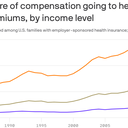Health insurance premiums are eating into workers' wages

Families with workplace health insurance may have missed out on $125,000 in earnings over the past three decades as a result of rising premiums eating into their pay, according to a new JAMA Network Open study.
Why it matters: While employers, rather than workers, typically bear the brunt of rising health insurance costs, the study is further evidence that rising premiums are costing workers through wages they would have otherwise received.
- And it's costing low-income employees and people of color the most.
The big picture: Premium growth has long outpaced wage growth, meaning that health insurance has become a larger and larger part of workers' total compensation as employers pay out more in health benefits.
- Premiums usually don't vary based on income level, making them a larger percentage of total compensation for low-income workers — who are disproportionately people of color — than those with higher incomes.
- Employer insurance has gotten more and more expensive as health care itself has gotten more expensive — the average workplace health plan last year cost $24,000 for family coverage, with employers covering about three-quarters of the cost, according to KFF.
- Although workers most directly feel the impact of their health care spending through out-of-pocket costs, economists have long argued that soaring premiums have suppressed wage growth.
By the numbers: In 1988, health care premiums on average accounted for 7.9% of a worker's total compensation, which includes wages and premiums. By 2019, that had increased to an average of 17.7%, according to a study led by researchers at the Friedman School of Nutrition Science and Policy at Tufts University.
- In each of the 32 years in the study period, health care premiums were a larger percentage of compensation for Black and Hispanic families than for white families with employer insurance.
- Those disparities have also increased over time, the authors found.
The bottom line: "Our results depict the hidden costs of increasing health insurance premiums for the U.S. worker: less opportunity for wage growth and a heavier burden of health insurance premiums on lower-paid workers and on Black and Hispanic workers," the authors conclude.